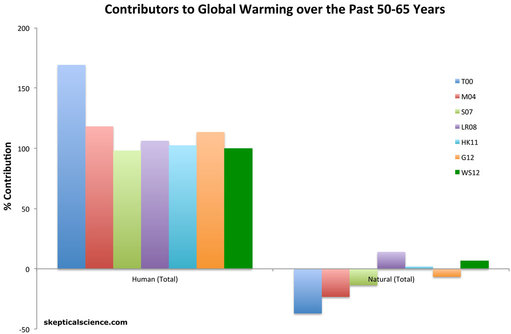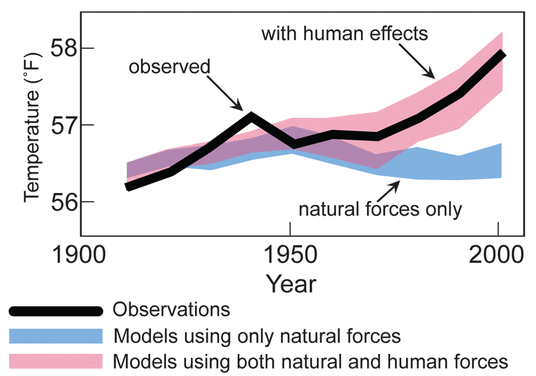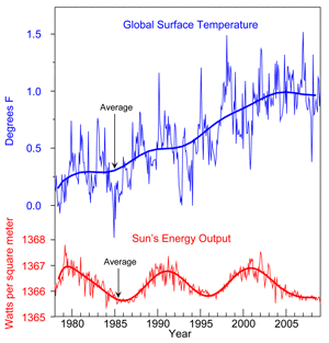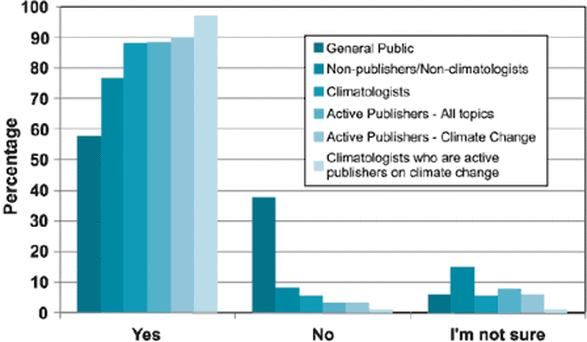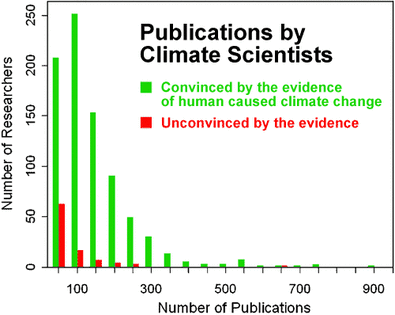Scientific Consensus on Global Warming
|
Navigation
|
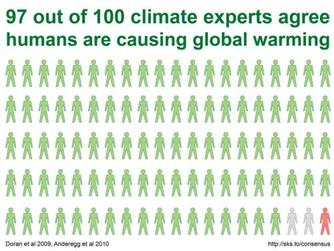 Source: Doran 2009, Anderegg 2010 | Graph: Skeptical Science
Every national academy of science of every major country in the world agrees. Every professional scientific society in every field related to the field of climate endorses it. 97-98 percent of all scientists that are most active in publishing in the field of climate science agree with it. The consensus is unequivocal: human activities are causing climate change. This overwhelming consensus among climate scientists has been confirmed by an independent study which surveyed all climate experts who have publicly signed declarations supporting or rejecting the consensus and found between 97% to 98% of climate experts support the consensus that human activities are causing climate change (Anderegg 2010). Most striking is the divide between expert climate scientists (97.4%) and the general public (58%). The paper concludes: "It seems that the debate on the authenticity of global warming and the role played by human activity is largely nonexistent among those who understand the nuances and scientific basis of long-term climate processes. The challenge, rather, appears to be how to effectively communicate this fact to policy makers and to a public that continues to mistakenly perceive debate among scientists." Moreover, a new survey (see also) of over 12,000 peer-reviewed climate science papers by the citizen science team at Skeptical Science has found a 97 percent consensus in the peer-reviewed literature that humans are causing global warming. There are no national or major scientific institutions anywhere in the world that dispute the theory of anthropogenic (human-induced) climate change. Not one. Learn more.
"The world is warming because of human activities and this is resulting in far-reaching and potentially irreversible impact on our Earth, atmosphere and oceans." ~Secretary-General Michel Jarraud, WMO Learn more.
|
|
|
Human vs. Natural Contributions to Global Warming
Various Peer-Review Studies | NASA Earth Observatory |
The National Science Academies, Royal Societies and Scientific Councils of Brazil, India, Russia, Canada, Italy, China, Japan, France, Germany, United States, Mexico, United Kingdom and South Africa have put forth a joint statement, urging global collaboration to combat the negative consequences of anthropogenic (human-induced) climate change, stating: "The need for urgent action to address climate change is now indisputable. It is essential that world leaders agree on the emission reductions needed to combat negative consequences of anthropogenic climate change. Climate change is happening even faster than previously estimated; global CO2 emissions since 2000 have been higher than even the highest predictions, Arctic sea ice has been melting at rates much faster than predicted, and the rise in the sea level has become more rapid. Feedbacks in the climate system might lead to much more rapid climate changes." Learn more.
The Intergovernmental Panel on Climate Change (IPCC), which includes more than 1,300 scientists from more than 130 countries contributing to their assessments, representing six years of work, more than 450 lead authors receiving input from more than 800 contributing authors, and an additional 2,500 experts reviewing the draft documents before issuing official reports, have stated: “It is extremely likely that more than half of the observed increase in global average surface temperature from 1951 to 2010 was caused by the anthropogenic increase in greenhouse gas concentrations and other anthropogenic forcings together.” IPCC defines "extremely likely" as greater than 95% probability of occurrence. 15 Things You Should Know About The New IPCC Report On Climate Science | View Latest Report
|
|
|
97.4% of Climate Experts Agree Humans are Causing Global Warming.
|
"Countless peer reviewed studies all indicate that the threat of climate change is real and that emissions of greenhouse gases from human activities will change the climate in catastrophic ways if unchecked. Because greenhouse gases remain in the atmosphere for many years, we do not possess the ability to fully avert climate change. However, we do have the ability to control our own destiny and avert the most serious consequences. In closing, we believe that acting now to address climate change will not only (hopefully) avert catastrophic consequences, it will create jobs, improve energy security and improve people’s lives the world over. Let’s get started now." ~World Resources Institute
|
|
|
Transition Town: The Consensus on Global Warming
Your browser does not support viewing this document. Click here to download the document.
"Natural causes are still in play today, but their influence is too small or they occur too slowly to explain the rapid warming seen in recent decades. We know this because scientists closely monitor the natural and human activities that influence climate with a fleet of satellites and surface instruments. Climate model simulations that consider only natural solar variability and volcanic aerosols since 1750—omitting observed increases in greenhouse gases—are able to fit the observations of global temperatures only up until about 1950. After that point, the decadal trend in global surface warming cannot be explained without including the contribution of the greenhouse gases added by humans. Although volcanoes are active around the world, and continue to emit carbon dioxide as they did in the past, the amount of carbon dioxide they release is extremely small compared to human emissions. On average, volcanoes emit between 130 and 230 million tonnes of carbon dioxide per year. By burning fossil fuels, people release in excess of 100 times more, about 26 billion tonnes of carbon dioxide, into the atmosphere every year (as of 2005). As a result, human activity overshadows any contribution volcanoes may have made to recent global warming. Changes in the brightness of the Sun can influence the climate from decade to decade, but an increase in solar output falls short as an explanation for recent warming. Although Earth’s temperature fluctuates naturally, human influence on climate has eclipsed the magnitude of natural temperature changes over the past 120 years. Natural influences on temperature—El Niño, solar variability, and volcanic aerosols—have varied approximately plus and minus 0.2° C (0.4° F), (averaging to about zero), while human influences have contributed roughly 0.8° C (1° F) of warming since 1889." ~NASA Earth Observatory |
2010 study by the National Academy of Science that surveyed 1,372 climate researchers indicated that 97-98% believed in man-made climate change.
Your browser does not support viewing this document. Click here to download the document.
Your browser does not support viewing this document. Click here to download the document.
|
"The evidence for anthropogenic climate change is now clear and convincing. The Earth’s surface has warmed by more than 0.8 °C over the past century, and by approximately 0.6 °C in the past three decades.1 This warming has been linked to more extreme weather conditions such as intense floods and droughts, heavier and more frequent storms, and a possible increase in frequency and intensity of the El Niño Southern Oscillation. These changes are largely caused by human activities, mainly the burning of fossil fuels releasing carbon dioxide (CO2) that traps heat within the atmosphere. These CO2 emissions continue to rise, and climate models project the average surface temperature will rise by 1.1 °C to 6.4 °C over the 21st century." ~ World Health Organization
Scientific Organizations and Climate Experts Endorsing the Consensus on Global Warming and Climate Change and their Statements:
The following scientific organizations endorse the consensus position that "most of the global warming in recent decades can be attributed to human activities"
The following scientific organizations endorse the consensus position that "most of the global warming in recent decades can be attributed to human activities"
Your browser does not support viewing this document. Click here to download the document.
Scientific Societies
Sign-on Statements
More Scientific Organizations Endorsing the consensus position that "most of the global warming in recent decades can be attributed to human activities":
The consensus is also endorsed by a Joint statement by the Network of African Science Academies (NASAC), including the following 13 scientific bodies:
For more information and for original sourcing, visit:
Skeptical Science National Wildlife Federation Environmental Defense Fund Union of Concerned Scientists NASA: Global Climate Change Causes NOAA: How do we know humans are the primary cause for the warming? |
National Science Academies
Intergovernmental Panel on Climate Change
Research
Your browser does not support viewing this document. Click here to download the document.
More scientific and health organizations endorsing the consensus position that "most of the global warming in recent decades can be attributed to human activities":
Two other Academies of Sciences that endorse the consensus: |
|
Last Revised: 11/20/13
Commenting Rules |





